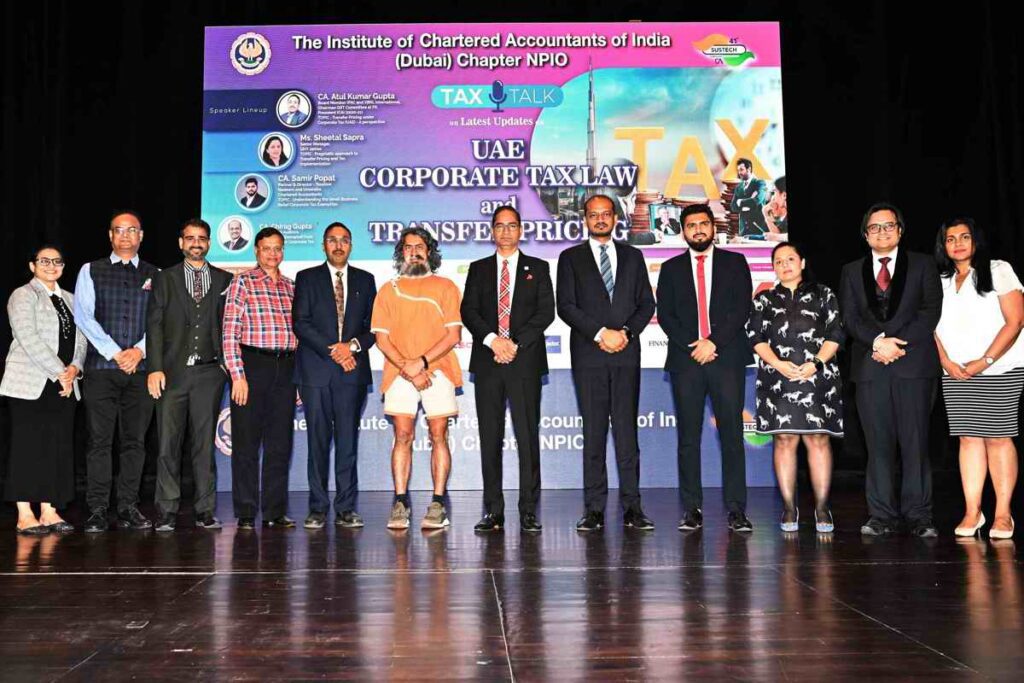ICAI Dubai Chapter held a captivating session titled “Tax Talk” on UAE corporate tax at the Emirates International School Theatre in Dubai on May 14. The session saw a full house audience consisting of chartered accountants, with over 500 attendees present. The purpose of the event was to address the need for expert guidance in tax matters, given the numerous ministerial and FTA decisions that have been recently published.
Jai Prakash Agarwal, the chapter’s secretary, emphasized the importance of differentiating between cabinet and ministerial decisions. He highlighted that although the UAE has maintained a relatively low corporate tax rate compared to other countries, residents and citizens also have a responsibility to adhere to fair tax practices and pay their business profits taxes without engaging in any activities that can be considered tax evasion. Agarwal further explained that “By paying due taxes, we will enable the government and the authority to keep the rate of taxes on lower side in longer run, which will be beneficial for all of us”.
During the event, a book focusing on UAE corporate tax was unveiled, showcasing a collaborative effort between the Dubai Chapter, another UAE chapter, and ICAI India. The chairman of the ICAI Dubai Chapter, Harikishan Rankawat, expressed that the purpose of this material is to expand the professional knowledge of its members and provide valuable insights for those who can gain from it.
Transfer pricing, another crucial aspect of corporate tax, was discussed during the session. Atul Kumar Gupta, a board member of IFAC and XBRL International, chairman of the GST committee at FII, and former president of ICAI, shared practical insights into the concept of arm’s length pricing between related parties and connected individuals. The speaker emphasized the importance of considering the tax impact on different aspects of business operations, such as costing, supply chain management, IT infrastructure, finance function, and compliance. It was highlighted that such a framework is necessary to ensure fair and equitable profits and taxes, as well as to protect a country’s right to collect its fair share of taxes and prevent multinational enterprises from shifting profits to low-tax jurisdictions through manipulative practices. The speaker also provided an overview of various transfer pricing methods, supported by practical case studies.
Expanding on the discussion of transfer pricing (TP), Sheetal Sapra, a senior manager at UHY James, offered a practical perspective on UAE taxes and their implementation. She highlighted that the UAE’s decision to adopt a competitive tax rate, lower than other GCC countries, aligns with its aim to maintain its position as a global business and investment hub. Sheetal also mentioned that, as of now, the UAE has not introduced a payroll tax. Additionally, she expressed the need for greater clarity regarding TP documentation requirements, particularly in terms of potential disclosure form thresholds and the identification of qualifying free zone individuals.
While a lot has been said about MNEs, Samir Popat, partner & director- taxation at Nadeem and Umendra Chartered Accountants said: “The Dh3 million revenue threshold limit established by Ministerial Decision no. 73 of 2023 has garnered appreciation for its beneficial impact on SMEs. Despite opting for small business relief, SMEs must adhere to mandatory requirements such as registering for corporate tax and filing tax returns. It is crucial for SMEs to approach the option of small business relief with caution. Factors to be carefully considered include the occurrence of losses during the specific tax period and the presence of interest expenditure to be carried forward, among others. By carefully examining these factors, SMEs can make informed decisions regarding their eligibility for small business relief and take advantage of its benefits.”


